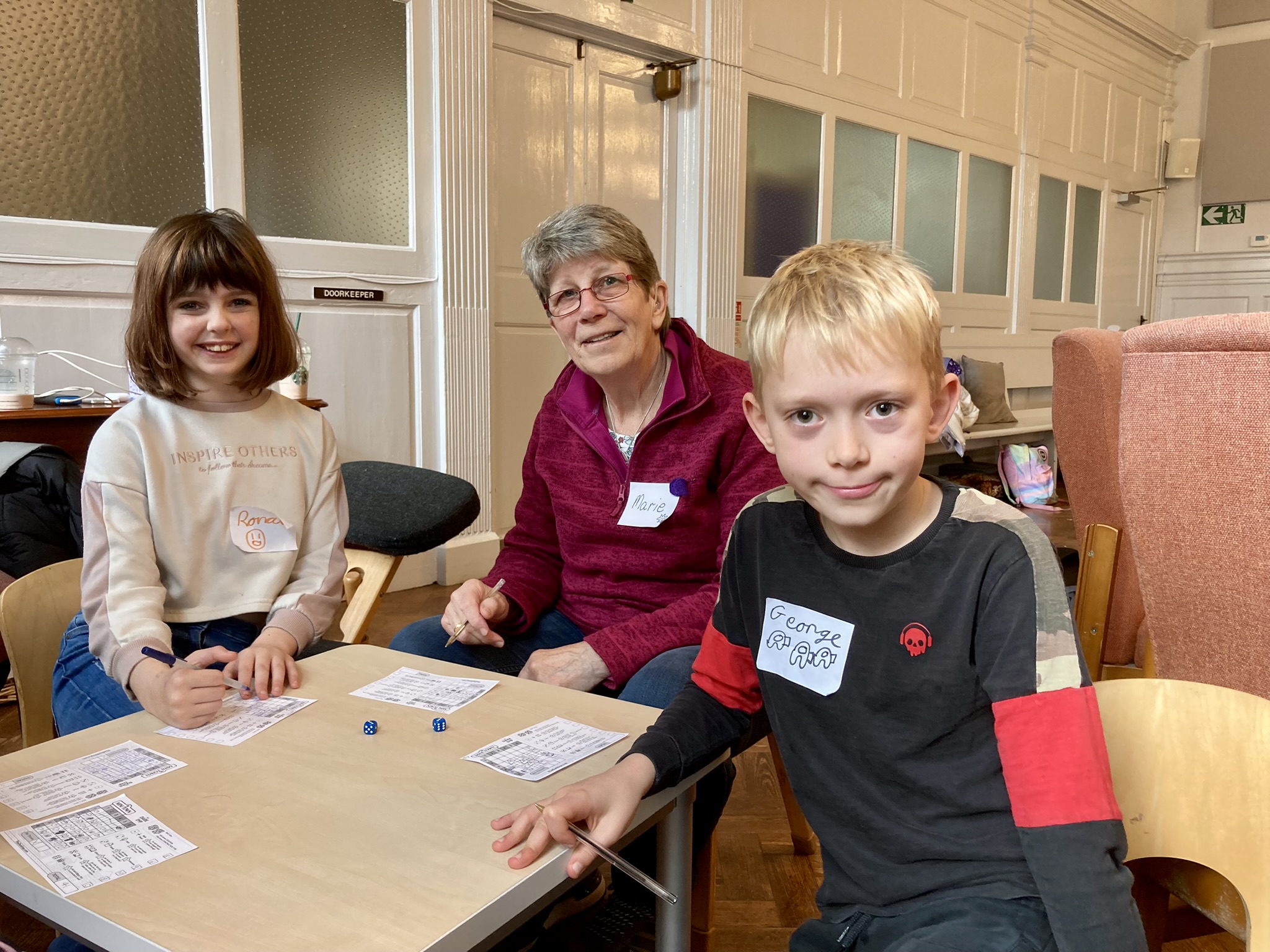This weekend I ran a workshop in Lancaster. Around 30 people attended for the morning, including seven children (mostly aged 7-13). A smaller group met again in the afternoon to think about how to build on the morning’s work.
We started with a game produced by Bez. “Wordy Connections” is a game for a large group moving around a room, so is perfect as an icebreaker. Each person takes a card, on which is written a word. They mingle, each repeating their word, until they find a group of words which they feel go together nicely. For example, one person may have “hedgehogs”, a second person “never”, and a third person “sleep”. If these three people like the way their words fit together, they can place them on a side table in order and go find new cards with different words. The lines of cards build up on the table, and when all of the cards have been used then one person will read out the resulting poem in a suitably dramatic fashion. It is, as the name implies, an excellent way to make some wordy (and often very silly) connections.
For most of the morning we split into three groups looking at messages (using three different topics of concern) and two groups looking at different types of games.
The children were in charge of the games, with one group playing “Mini Town” from The Dark Imp and another group playing “Roll & Colour” by myself. Both groups of children reported back to the larger group about the games they’d played, highlighting both how the game worked and whether there was any message. Mini Town rewards players for building large parks in their town, as well as placing libraries next to houses, houses adjacent to parks, and cafes spread out across the board instead of clustered. Roll & Colour scores for having as wide a range of different colours amount the flowers as possible, provided they are spread out — a conscious nod to diversity. The two groups of children playing the games explained this all exceptionally well!


The three groups of adults explained how they had been working towards specific messages. Each group had been looking at a different subject, but within that subject they had all covered:
- What the issue was
- Why it was a problem
- Where the problem had come from
- Who could change it and how
- Who they (the group) could speak to about it
The first group looked at the issue of food waste. The local council in Lancaster doesn’t collect food waste, although they do collect garden waste. Some other councils in the wider area do collect food waste, and one participant was able to tell the rest of the group what could be done with the food waste in order to turn it into energy. Although food waste collection is linked to wider issues (not least of all preventing so much wastage from supermarkets) this was felt to be focused, discrete issue which could be taken up directly with local councillors.
The second group considered the impacts on climate change on Lancaster and the wider area, and how people would need to adapt. Rather than a game in which players try to stop climate change, the group wanted to emphasise the ways in which we’d need to change our lives. This was very much a conversation about speaking to other members of the public.
The third group looked at the issue of declining Quaker Meetings. This was a Quaker Meeting, so therefore it was an existential issue — how could Lancaster Quakers grow and expand as a community? This issues threw up far more questions than it answered: questions about why people came, why they stayed or left, what the image of Quakers was in Lancaster.
Having considered the messages, the groups came together to think about who they might target the messages at and how. This draws together two different types of “who” and two different times of “how”. One is “who has the power to change things and how will they do it”. The other is “who are we able to talk to about this and how can we reach them”.
During the course of the afternoon, our discussions lead us to suggest some possible ways forward. These were:
- Food waste. A game on a a greetings card, sent specifically to councillors. The game would be a simple solo game where the player tried to collect as much food waste and garden waste as possible to use to turn into electricity or compost. Participants at the workshop were confident that they could create something which could nudge councillors to thin more about food waste.
- Climate change. A bigger game, possibly something like a pack of cards. There would be a number of “bad things” such as flooding or power cuts which would steadily increase. The aim of the game would be to be prepared for these events, and to help the other players to also be prepared.
- Growing as a community. The group thought that this was less an opportunity for a game, and more a chance for an infographic. Some of the reasons people don’t join is because they don’t know about when and way Quakers meet, so perhaps finding new ways of sharing the information would work. Others thought that a flow chart of different ways of exploring spirituality might be a good approach.
At the end of the workshop the wider group was therefore left with one clear and achievable plan for a micro-game about food waste, one potential larger game idea around adapting to the impact of climate change which would need more consideration, and a slightly different set of ideas for messages and outreach to help grow the community.

